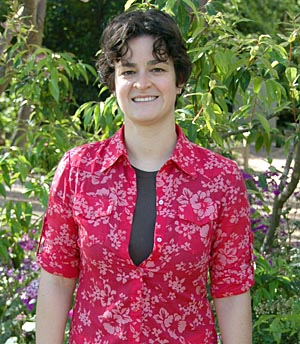Name: Genevieve Graves
Age: 29
Degree: Ph.D.
Field of study: Astronomy and astrophysics
Faculty adviser: Sandra M. Faber
Undergraduate education: Harvard
Hometown: Albany, CA
Most memorable experience at UCSC?
The most memorable aspect of my time at UCSC is not a single event, but a continuum of experiences: the meetings with my thesis adviser. I would sometimes come into those meetings feeling discouraged or distracted, but conversations with Sandy always energized me and reinvigorated my drive to understand the universe. The intensity of those discussions and the open mulling of scientific ideas was the most exciting part of my graduate study.
Favorite spot on campus and why?
The trail that leads from the ARCenter to the base of campus. It is a quiet, open walk with gorgeous views across the Monterey Bay. I meet more animals on the trail (deer, birds, gophers, snakes, even a bobcat!) than people. Walking there clears my head and makes me feel connected to the natural world when I need it most.
How has your UCSC graduate education shaped you professionally?
The UCSC Astronomy Department has been both a supportive and a challenging academic home in which to become an astronomer. The continuous engagement, particularly the informal discussions with faculty, postdocs, and other grads over coffee and in the halls has been wonderful. It has helped me develop a broader perspective on the field, as well as honing my abilities to explain my work, rethink my work, and engage with the work of other astronomers.
What are your plans after graduation?
I will be a Fellow at the Miller Institute for Basic Research at UC Berkeley. This fellowship gives me three years of support and research funding to pursue my own research program, with no other formal duties. The Miller Institute gathers together its members--fellows, faculty, and visiting faculty from all fields of science--for a weekly lunch in order to foster discussion and interaction between scientists in a variety of disciplines. I am very excited to be a part of this intellectual community of scientists.
Accomplishments:
My thesis research has focused on the formation and evolution of a particular class of galaxies, which include the biggest galaxies in the Universe. Our own Milky Way is continuously forming new stars, and with them new planetary systems and possibly new worlds such as our own. In contrast, the galaxies I study are "dead" systems that have stopped forming stars. A major unsolved problem in astronomy is when and how star formation ended in these galaxies. These galaxies had active lives in the early universe, forming most of their stars within a few billion years after the Big Bang at a time that is difficult to observe with even the most powerful telescopes. My research could therefore be described as "galactic forensics": I look at what is left of the galaxy and try to determine "who killed NGC 4881?"
I have received a number of awards and fellowships while a graduate student. These include the UCSC Astronomy Department Whitford Prize for excellence in research and course work through the second year, a Regent's Fellowship, an ARCS Foundation Fellowship, and a Chancellor's Dissertation Year Fellowship. I have also written a successful Hubble Space Telescope proposal to look at the ultraviolet light from galaxies that have recently stopped forming stars in order to identify the last sites of star formation in these objects, which included $160,000 in research grant money.



